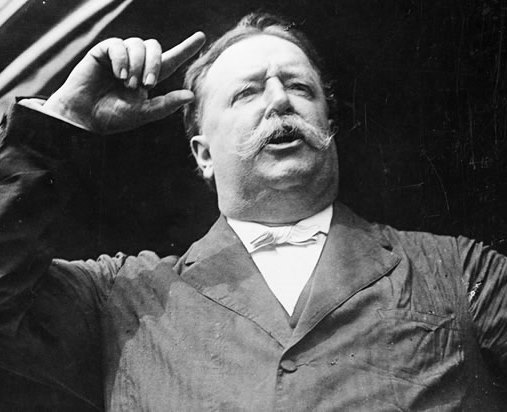 In a wide-ranging discussion of the Progressive Era in her new biography of Calvin Coolidge, Amity Shlaes quotes a striking excerpt from a little-known speech by President William Howard Taft.
In a wide-ranging discussion of the Progressive Era in her new biography of Calvin Coolidge, Amity Shlaes quotes a striking excerpt from a little-known speech by President William Howard Taft.
Given in the middle of the 1912 election, in which Taft competed (poorly) against Woodrow Wilson and former President Teddy Roosevelt, the speech focuses on the predominant themes and schemes of his opponents, handily highlighting their limits.
In a particularly snappy swipe at Roosevelt, who had just recently split from the Republican Party, Taft notes that despite various efforts to form new parties, any rumbling therein is largely driven by the “promise of a panacea,” a top-down fantasy “in which the rich are to be made reasonably poor and the poor reasonably rich, by law.” Instead, Taft argues, we should seek solutions that “bring on complete equality of opportunity,” unleashing individuals and communities to work, create, and collaborate. The bones of civilization are not built, first and foremost, by the bidding of the policymaker’s baton.
Shlaes quotes the speech in passing, but the full text (or audio!) is well worth taking in:
We are living in an age in which by exaggeration of the defects of our present condition, by false charges and responsibility for it against individuals and classes, by holding up to the feverish imagination of the less fortunate and the discontented the possibilities of a millenium, a condition of popular unrest has been produced.
New parties are being formed with the proposed purpose of satisfying this unrest by promising a panacea. Insofar as inequality of condition can be lessened and equality of opportunity can be promoted by improvement of our educational systems, the betterment of the laws to ensure the quick administration of justice, and by the prevention of the acquisition of privilege without just compensation—insofar as the adoption of the legislation above recited and laws of a similar character may aid the less fortunate in their struggle with the hardships of life—all are in sympathy with the continued effort to remedy injustice and to aid the weak. And I venture to say, that there’s no national administration in which more real steps of such progress have been taken than in the present one. But insofar as the propaganda for the satisfaction of unrest involves the promise of a millenium—a condition in which the rich are to be made reasonably poor and the poor reasonably rich, by law — we are chasing a phantom. We are holding out to those whose unrest we fear, a prospect and a dream, a vision of the impossible.
After we have changed all the governmental machinery, so as to permit instantaneous expression of the people in constitutional amendments, in statutes, and in recall of public agents, what then? Votes are not bread, constitutional amendments are not work, referendums do not pay rent or furnish houses, recalls do not furnish clothing, initiatives do not supply employment or relieve inequalities of condition or of opportunity. We still ought to have set before us the definite plans to bring on complete equality of opportunity, and to abolish hardship and evil for humanity. We listen for them in vain.
Taft clearly understands the bottom-up nature of human flourishing and the destructive potential of top-down planners and levelers. Given the modern mushrooming of “governmental machinery,” the continuous sapping of “popular unrest” by today’s Planning Class, and the overlap of this and that between today’s Left and the Right, there would appear to be a lesson here somewhere.
Our challenges and divides are certainly distinct from those in Taft’s time, but the laws of men still have their limits and, alas, the Great Progressive Prospect is still, as Taft calls it, “a vision of the impossible.”
[product sku=”1028″]

